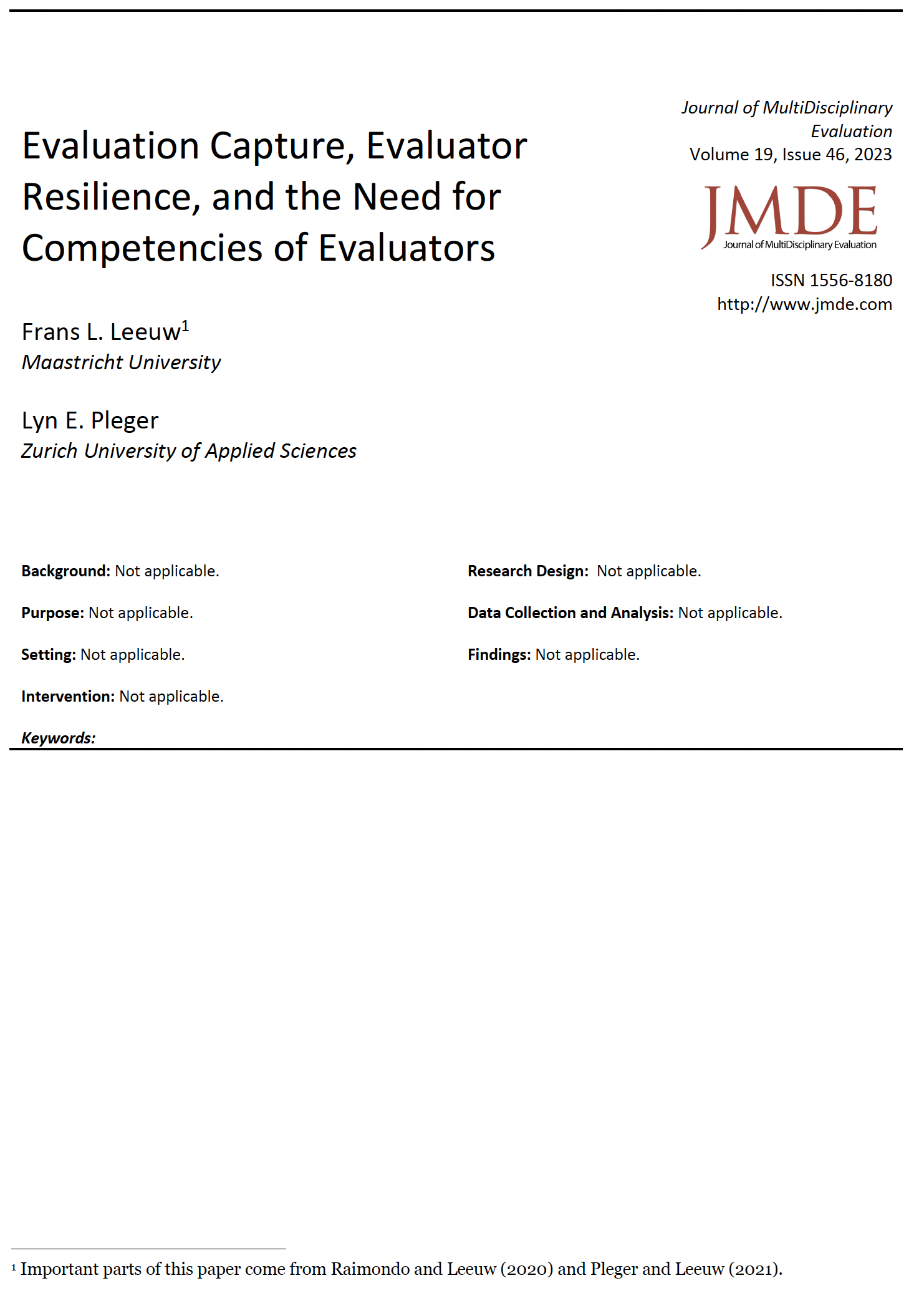Evaluation Capture, Evaluator Resilience, and the Need for Competencies of Evaluators
Main Article Content
Abstract
Evaluation capture is the situation in which evaluations and evaluators are surrounded by protocols, guidelines, standards, norms, criteria, templates, oversight and reviews from national and supranational organizations, governments, NGO’s and agencies that ask for and finance monitoring and evaluation activities; these protocols and guidelines are sometimes labelled or part of ‘evaluation policies.’ The paper describes several developments in evaluation that contribute to this capture, referred to as mechanisms. The paper also addresses the question how to tackle this issue. The focus is on the role of the evaluator’s resilience, while several competences of evaluators to realize that are also addressed.
Downloads
Article Details

This work is licensed under a Creative Commons Attribution-NonCommercial 4.0 International License.
Copyright and Permissions
Authors retain full copyright for articles published in JMDE. JMDE publishes under a Creative Commons Attribution-NonCommercial 4.0 International License (CC BY - NC 4.0). Users are allowed to copy, distribute, and transmit the work in any medium or format for noncommercial purposes, provided that the original authors and source are credited accurately and appropriately. Only the original authors may distribute the article for commercial or compensatory purposes. To view a copy of this license, visit creativecommons.org
References
Barnett, M. N. & Finnemore M. (2004). Rules for the world: International organizations in world politics. Ithaca, NY: Cornell University Press.
Bjørnholt, B., & Larsen, F. (2014). The politics of performance measurement: ‘Evaluation use as mediator for politics’. Evaluation, 20(4), 400-411. DOI: https://doi.org/10.1177/1356389014551485
Cole, Ryan L. (2015). Books and culture, The Admiral of the Atom, A new PBS documentary gives naval pioneer Hyman Rickover the credit he never got in life. City Journal, https://www.city-journal.org/html/admiral-atom-9847.html
Dahler-Larsen, P. (2018). The skeptical turn in evaluation. In J. E. Furubo & N. Stame (Eds.). The evaluation enterprise. (pp. 58-80). New York: Routledge. DOI: https://doi.org/10.4324/9780429470202-3
Dal Bó, E. (2006). Regulatory capture: A review. Oxford review of economic policy, 22(2), 203-225. DOI: https://doi.org/10.1093/oxrep/grj013
Eckhard, S., & Jankauskas, V. (2019). The politics of evaluation in international organizations: A comparative study of stakeholder influence potential. Evaluation, 25(1), 62-79. DOI: https://doi.org/10.1177/1356389018803967
Leeuw, Frans and Jan Eric Furubo (2008).'Evaluation systems: what are they and why study them?'. Evaluation, 14 (2), 157-169 DOI: https://doi.org/10.1177/1356389007087537
Ling, Shichun, Rebecca Umbach, and Adrian Raine (2019). "Biological explanations of criminal behavior". Psychology, Crime & Law, 25(6), 626-640. DOI: https://doi.org/10.1080/1068316X.2019.1572753
Pleger, L. E., & Leeuw, F. L. (2021). Resilient Evaluators: Characteristics, Conditions and Prospects. In van den Berg, R.D., Hawkins, P., Stame, N. (Eds.). Ethics for Evaluation: Beyond “doing no harm” to “tackling bad” and “doing good” (pp. 141-162). New York: Routledge. DOI: https://doi.org/10.4324/9781003247234-9
Pleger, L. E., & Hadorn, S. (2018). The big bad wolf’s view: The evaluation clients’ perspectives on independence of evaluations. Evaluation, 24(4), 456-474. DOI: https://doi.org/10.1177/1356389018796004
Pleger, L., & Sager, F. (2018). Betterment, undermining, support and distortion: A heuristic model for the analysis of pressure on evaluators. Evaluation and Program Planning, 69, 166-172. DOI: https://doi.org/10.1016/j.evalprogplan.2016.09.002
Raimondo, E., & Leeuw, F. L. (2020). Evaluation Systems And Bureaucratic Capture: Locked. In B. Perin, & T. Tyrell (Eds.). Changing Bureaucracies: Adapting to Uncertainty, and How Evaluation Can Help (pp. 143-160). New York: Routledge. DOI: https://doi.org/10.4324/9781003100584-12
Raimondo, E. (2018). The power and dysfunctions of evaluation systems in international organizations. Evaluation, 24(1), 26 – 41. DOI: https://doi.org/10.1177/1356389017749068
Raimondo, E. (2016). The institutionalization of monitoring and evaluation systems within international organizations: A mixed- methods study. A mixed-methods study. PhD diss., George Washington University, Washington, DC, ProQuest Dissertation Publishing.
United States Naval History and Heritage Command
Walker, B., & Salt, D. (2012). Resilience thinking: Sustaining ecosystems and people in a changing world. Island press.
Weiss, C. H. (1973). Where politics and evaluation research meet. Evaluation, 1(3), 37–45.

